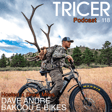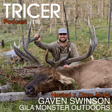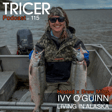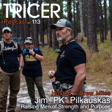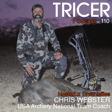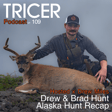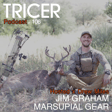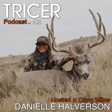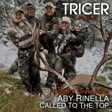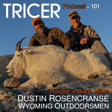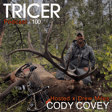Introduction and Opening Prayer
00:00:00
Speaker
You are listening to the Tricer Podcast, where we talk all things hunting, gear, and the great outdoors. Before we begin, let's start things out right and put God first. Lord Jesus, I thank you for Tricer, and I ask that you can use this podcast as a way to bring joy to all of our listeners. We lay Tricer and this podcast at your feet.
Introducing Dan Gates and Wildlife Management Issues
00:00:22
Speaker
I've got, a um, an important one here. I've got Dan Gates here from Colorado rodins for a small to wildlife management coming on to, uh, talk about a bunch of stuff going on in Colorado and how we can help those guys. Um, it's important, man. And could be from California. We banned lion hunting in the nineties. We see, this is not a good duration. You put game cameras up. We see more lines than we see deer on our cameras now.
00:00:50
Speaker
um We banned bobcat hunting in 20... I think it was 2021. When they had the meetings, the biologists literally they said, I've never seen a bobcat in the wild. And I kid you not, I see a bobcat every dang time I go out in hunting in San
Proposition 127: Implications and Challenges
00:01:08
Speaker
Diego. They're everywhere.
00:01:10
Speaker
um This is the left's way to attack us. This is the opposition's way to attack us. They go for the cute stuff first, and then the deer is the next thing. you know and i mean We're already sitting here in California. They want to take bear. We have Project Coyote in California. They want to take coyote hunting away. They just try and get you wherever they can, and lions and bobcats are where they're going after Colorado. and There's a man standing in the gap and that's Dan Gates. So Dan, I'm going to pretty much turn this show over to you and let you do your thing because I don't know anything. I can say that I was in Colorado two weeks ago and I glassed up three lions. There's definitely not a, ah definitely not extinct over there. i've seen more I saw more lions.
00:01:49
Speaker
in that unit that I've ever seen. I've only glossed through a few lines in my life and I sold three of them at Hunt in that one area I was in. So ah there's a lot of them over there. You're introducing wolves into your thing. I mean, they're just, they want to go after you guys bad. So I'm going to turn this thing over to you, Dan, and let you have your way with it.
00:02:05
Speaker
Well, Drew, I appreciate the opportunity seriously. And and we're we're kind of into the last 35, 36 days of this campaign. And we're writing the coattails of guys like you and other podcasters and influencers and and industry leaders to be able to to you know get the message out further, ah broader, and and enhance the message that we need to be able to create, especially during hunting season. I mean, it's hunting season. We're our we're are our guys, mostly in the field. If they're not in Alaska, they're in Canada. And if they're not there, they're...
00:02:36
Speaker
you know hunting in some other state or waiting to hunt, and ah or they might be an outfitter, they might be an agriculture producer, and what are they doing this time of the year? They're pulling calves out and and and getting out of the high country and getting off the public land. and And getting ready to ship. And so they're the the only time we can get the message of all all those guys is is like this. And we can't afford to buy this sort of stuff. So capitalizing off of you guys and riding your coattails and piggybacking off your generosity is is imperative. But as you mentioned, we got a Bob Catton, a mountain lion ballot initiative coming up that the voters are going to get a chance to vote on.
00:03:14
Speaker
We've been fighting this at multiple levels since September 22nd of last year. And we went through all the proper procedures, protocols, title boards, Secretary of State, Supreme Court, to the tune of several hundred thousand dollars to get us to a point to where we're at now. The signatures have been gathered by the opposition.
00:03:32
Speaker
And we went from what it was originally called Initiative 91 to a final certification through the Secretary of State in its Proposition 127. So 127 will be on the ballot for the voters on November 5th, and they will attempt to try to alter science-based wildlife management when it pertains to these these two specific species.
00:03:57
Speaker
But to where people aren't listening to me about my supposed wisdom and and my opinions, I brought the documentation to where I could read verbatim exactly what is going to happen off this. And so they can interpret not just from me or the opposition, but they can listen to the legal side of things and from the management side of the experts at Colorado Parks and Wildlife that's been managing our wildlife resources for the last 125 years. and And so when people ask, what does this Proposition 127 do?
00:04:27
Speaker
Proposition 127 would prohibit intentionally killing, wounding, pursuing, entrapping, or discharging a deadly weapon at Bobcats, Lynx, and Mountain Lines in Colorado. While the measure uses the term trophy hunting, it bans all hunting, pursuing or entrapping of Bobcats, Lynx, and Mountain Lines regardless of the intent.
00:04:47
Speaker
Individuals convicted of any of these activities are subject to up to 364 days in jail, a fine of up to $1,000 or both, and a five-year prohibition on holding a license issued by Colorado Parks and Wildlife with more stringent penalties for subsequent convictions. I need to throw out that links for those that don't know are federally and state protected in the lower 48, so there's no harvesting of them at all. But the proponents of this measure,
00:05:15
Speaker
were steadfast in making sure that links were included in this in case they ever became delisted. And there might be an opportunity for some sort of harvest in this state. That's not likely that they would ever become delisted because of the federal component.
Government vs Hunter-led Wildlife Management
00:05:30
Speaker
But if you look at what Colorado has endured over the course of the last seven or eight years, especially since this governor has taken over with the animal rights extremist mentality.
00:05:39
Speaker
And that's on the agriculture side and the common sense wildlife management side. It's not out of the realm of possibilities to read the language of intentionally killing, wounding, pursuing, entrapping, or discharging a deadly weapon at, that if you take mountain lions and bobcats out of the equation, the statutory definition of trophy hunting would be set in Colorado statute the first time in the United States that trophy hunting would be defined as hunting.
00:06:09
Speaker
You can turn around and take elk out and put it into the spot of bobcats and you could turn it on and take big horn sheep or maybe it's mallard ducks. In Colorado, we've got 78 game species out of 961 species of wildlife, but 78 game species that people purchase licenses for to be able to pursue that endeavor. Maybe that's waterfowl, maybe it's small game. It might be predators. It might be be big game of which we have multiple species of big game.
00:06:38
Speaker
But our predators that we have are bears and mountain lions that are classified as big game. And even though we we voted as a state to reintroduce wolves, which has been a slow, tenuous, very tumultuous process, wolves are not big game species, and they will not be listed as a big game of species. And the reason I mention that is because if this proposition goes through, 127 goes through, and mountain lions are not listed as a big game species anymore,
00:07:08
Speaker
The depredation claims on mountain lions to farmers and ranchers for their sheep or their goats or their cattle or whatever would not be compensated any longer because they would not be classified as a big game species. And so while there's eight exceptions to the rule to where people could kill a mountain lion during this process,
00:07:28
Speaker
There's no exception for harvest. And so where they could kill a mountain lion for human health and safety and protection of private property and livestock and so forth, there would be no compensation any longer. And they they act like that, oh, there's still methods that people could hunt mountain lions. Nothing could be further from the truth because you hunt to pursue and kill and wound or stalk or entrap is what the intent of hunting is, even though I don't know anybody, Drew, that intensely wounds anything. But it's it's the language in here.
00:08:03
Speaker
The instances where people say in this measure that you could still kill lawfully is not part of harvest. It's not part of management. It's not part of science. It's a human animal conflict resolution component that they act like that's still given us, even though we have it in statute as of now. So they're not giving us anything. We already have all those measures and those exceptions currently, along with hunters, licensed buying hunters and sportsmen.
00:08:29
Speaker
that are purchasing last year, for instance, 2,500 and some odd mountain lion licenses with a success rate of 502 licenses or lions that were harvested for a success rate of around 19%. So 81% of the people that are buying tags are out there and they're contributing to the management of lions and they're not taking anything off of the landscape. They're buying that resident or non-resident tag after they went through the appropriate test and the education course to be able to identify a lion, a male or a female lion, and once they cert of them once they could pass that certification, then they can go buy a license. but Once they bought that license, they just didn't go willy-nilly. They had to go some specific location where the quotas are met to a specific mandate that the science-based agency has permitted.
00:09:17
Speaker
And then every day before you hunt, you have to check online to see if that area is still open and that those quotas have not been filled. This is the most stringent, most regulated big game species on the planet when it comes to hunting.
00:09:33
Speaker
But the opposition doesn't want us to do it in any way, shape or form. And that's why they've created so many fallacies and falsehoods and lies and and
Campaigns Against Proposition 127
00:09:40
Speaker
you know the speculative side of what they say that sportsmen and women do. And they even with the game and fish department, the parks and wildlife department does, is all lies and deceit. And we're hoping that with what we've created so far through the Colorado's for responsible wildlife management,
00:09:57
Speaker
And the actual campaign that I co-chair, which is Colorado Wildlife Deserve Better, that's the actual campaign itself that will say vote no and has said vote no on all of this. Well, CRWM is providing the ancillary parallel component to be able to get the sportsmen and women engaged.
00:10:16
Speaker
and let them know that this is not about mountain lions and bobcats. Let them know that we need extensive funding and we need partnership from other states and entities and individuals and businesses to be able to pull this off. And we've done that very formatively so far, but we're getting down into the nitty gritty to the nut cutting as a cattleman would say. And we got 35 days left to hopefully get the people of Colorado to make an educated decision and support science-based wildlife management. That's a long drawn out explanation of where we're at right now, but it's a pretty good comprehensive overview.
00:10:47
Speaker
So I got a few questions. One, are you guys trapping lines there? Like trapping? You're not, right? so But they put that in there because it sounds like you are. Yeah, the way that they word that is it sounds like that you are and and we can't use foot old traps and snares and body gripping devices because we banned trapping here in 1996. So why is it in there? Just to make it make you look look bad? Yeah, the only thing that we can use is cage traps in the state of Colorado. So everything is caught in a cage, which remarkably, I mean, trying to get the people to understand this and guys like you might be able to turn around and spread the word in the next, you know, couple weeks. But
00:11:24
Speaker
It's okay to go to Oregon and trap wolves and put them in a cage and bring them here or Washington or go to british British Columbia and leave them in a cage for two or three days while they feed them. and they do it but But it's not okay to trap a bobcat in a cage and leave them sit there for 24 hours or less. We can't cage trap mountain lions, but they do cage trap mountain lions for some of their studies.
00:11:47
Speaker
through the science. we're not we're not That's my point. so we're not like When I say weir, we're going we're going to use weir as like us. yes We're not cage-trapping lions. I don't know anybody who's got tra like ah like one of those big old trailers that's towing around that's just dropping it off in the hills to catch a lion. It's not happening. We're not trapping lions. we're not they But it sounds like now from an uneducated person, voter, they're seeing All they think of is this big claw trap, just stuck on a lion and you know and they use these pictures. I see it, like you go to Montana, I mean, I was just in Colorado, Wyoming. I mean, there are so many billboards, you guys, who haven't been, like just just like a poor defenseless lion and end the cruelty. And it's always those freaking Disney character ah animals up there. But we this so doesn't work clear. We are not trapping these animals right now. I mean, maybe cage traps, when you think of a cage trap, that's gonna be like your typical
00:12:38
Speaker
Steel cage shop you buy, has a door on it. Have a hard cage trap. I mean, if we want to trap on public land or private land for recreational or avocational purposes, we have to use cages.
00:12:51
Speaker
period. It doesn't matter what you want to do, a coyote or raccoon or a beaver or bobcat, but that's for bears and small game, but we cannot cage trap any big game and we cannot foothold trap period when it comes to that. Or snare or snare trap or snare trap or a body gripping device like a kind of bear trap or not. car bear or something Yeah. So, okay. So that's not happening. Um, second thing I want to bring up, you said you guys killed 500 lions last year. Now I don't know the exact number. I know it's like six,
00:13:18
Speaker
So in California, we're not allowed to hunt lions. The state still kills 600 lions a year. Close to that. Close to that. And we are having in California, I'm not trying to be like, it's kind of, it's finally, like when we first did it, like it wasn't so bad, right? Now we're in 2024, we're 35 years from removed. We haven't hunted lions since the seventies. I don't remember the whole backstory behind it, but we haven't So lies are so prevalent now that we are having a lot more attacks. They're coming very common in California. We're having kids get attacked. We had a kid in San Diego get attacked in the canyon. We're having these things up by the Hollywood sign. They're coming into neighborhoods. I mean, they're getting pushed out because they're, they're not getting, um, so there's a danger factor there as well that will, might not, you might not see it right away, Colorado, but give it 20 years of this, you're going to see it and you will 100%. Those things got to eat a deer a week.
00:14:10
Speaker
You 100% will see your deer hunting go down, which in turn will make tags harder to get, which in turn make less hunters in the field, which is the end goal of this whole thing. Less hunters we have, the more we can vote for their stuff. The point behind that is, is they're still going to kill 500 lions a year. I guarantee it. They're still going to go out and kill them because I guarantee you right now, that's 500 hunters killed. How many lions of fish and wildlife killed last year? Do you know? Well, the it's less than 30.
00:14:40
Speaker
that that had to had to be euthanized or caused some sort of depredation, that there wasn't some sort of a licensed buying hunter that participated in. Now, I'm not saying that any one of the 500 weren't part of a depredating component during during some sort of ah an the issue or circumstance. But look, the fact of the matter is, if you read the language of what they have,
00:15:06
Speaker
And if you says if you read what it says in here, which is the blue book that I'm referencing, and the blue book for those that don't know in a state that has ballot initiatives, is is all of the the technical jargon and terminology that is in here. This this year, this book is 88 pages, I believe, and three and a half pages are dedicated to Proposition 127.
00:15:27
Speaker
But it's specifically said that CPW is responsible for wildlife management in Colorado and administers regulations for hunting, fishing, and trapping as adopted by the Colorado Parks and Wildlife Commission. State law requires wildlife and their environment to be protected, preserved, enhanced, and managed for the use, benefit, and enjoyment of the people and the visitors of Colorado. CPW manages individual animal species differently and uses regulated hunting, fishing, and trapping to meet management goals.
00:15:53
Speaker
Then it goes into a bunch of tables and stuff. Well, that's part of 33-1-1-01, the statutory component of our management system, what Colorado Parks and Wildlife adheres to. The interesting thing that if you look at the arguments and the arguments for Proposition 127, and then there's arguments against 127, which is on on our side, but it says,
00:16:17
Speaker
that bobcat and mountain lion populations can naturally regulate themselves without the need for hunting or trapping. And there is no consistent evidence that banning these activities would create new dangers to the public. Big cats provide valuable ecological contributions and Colorado should protect them rather than allowing them to be hunted. Where circumstances warrant it,
00:16:40
Speaker
federal, state, and local officials will still be allowed to protect human life with lethal and non-lethal methods. That's the same stuff that you guys are doing out there. That's that's what's so such BS though, because if they if they manage themselves, so California wouldn't be killing 600 a year, right? That's my point is that you're going to
00:17:04
Speaker
like for The bobcats, they're not going to be they're not going to be getting managed like the lions. The lions are going to get killed. like That 500 lions are going to get killed. If you don't kill those 500 lions, that's 500 more lions on the landscape this year, 500 next year. we're produc it is This thing's exponential. They're going to start breeding. You're going to be having lions get pushed out into places they shouldn't be, and they're going to be getting killed. It's the bottom line. The ecosystem's not going to withstand four toms in a square mile. right like we We say in California, we get a lion every square mile, something like that in the hills. It's crazy.
00:17:34
Speaker
um They're going to get pushed out. they're going They're going to be killed because they're going to become problem lions. It's the bottom line. like it's just But we're talking common sense stuff. um and Common sense is not very common when it comes to left because they just and they'd just rather they'd rather have the government do it than have a hunter do it. I don't know understand why. and One of the most frustrating things for me with that is as somebody who I don't want to say, you don't have to say this. I'll say it. I don't like government because I think government does everything inefficiently. So, so now you're going to have these guys managing this resource. It's going to cost us thousands of taxpayer dollars rather than just have hunters paid to do that. Put that back into our, so instead of taking our sportsman's dollars and putting it towards wildlife, we're going to take the money that we're not, we're now we're not going to put that money into it. Those 2,500 tags. Now we're going to pay someone to do it. Millions of dollars a year, millions of dollars a year because the government does nothing efficiently.
00:18:24
Speaker
efficiently you know There's going to be a lion task force of whatever, 10 guys. right There's going to be a predator task force built just for this now. because As soon as this is done, it's going to happen because they're going to have to do it because you're going to have these things that need to be taken care of now because hunters aren't doing it. so you're just it's just It's just baffling to me. It's it's so backwards to protecting wildlife and helping wildlife.
00:18:46
Speaker
It's just people, I don't know. How'd you guys get here? I mean, how about that? Like, what
Political Influences on Wildlife Policies
00:18:50
Speaker
did you do wrong? How'd you get here? Well, we already did it. I mean, we became somewhat Californicated. And what people didn't do from California to come here, the politicians that came here were like-minded in the sense to where they wanted to patronize anything that had to do with wildlife or domestic animal production.
00:19:14
Speaker
anything to do with oil and gas, anything to do with logging, anything to do with recreation when it came to the utilization of our public lands and resources. It's an ideology that has spread and this program process and program started back in around 2000 to 2002 when our last Republican governor was ah in office and the Democrats said, over my dead body will we ever have another Republican governor? And they've been they've been successful on that ever since.
00:19:41
Speaker
They know that through appointments and they knew through elections that there's an opportunity for them to capitalize on on their agenda. And it just so happens that we have two of the largest animal rights extremists in this office here. And I say two because we have Governor Jared Polis and we have his husband, ah Marlon Reese, who is the instigator behind 99% of this stuff. But how we got here was back in 1992, there was a initiative 10, which was attempting to ban the harvest of bears.
00:20:11
Speaker
with bait and hounds in the spring, and that passed. And then shortly after that, in 1996, there was Amendment 14, which the amendment to the Colorado State Constitution banned the ability to be able to use foothold traps, body gripping devices, and cable restraint devices, except for extreme circumstances on private land, but nothing on public land and nothing for recreational or avocational purposes.
00:20:34
Speaker
In 2020, when this governor, two years after he took the office, ah they formulated a plan ah that he supported. I'm not saying he did it himself, but he damn sure supported, in which he has strongly supported now to bring in wolves and reintroduce wolves in the state of Colorado, which passed by a very, very, very narrow margin, 50.9% to 49.1%.
00:20:58
Speaker
Then they decided to move into the next level after we defeated them at every single level that but that we possibly could. We defeated them in 2019 at the Colorado Parks and Wildlife Commission with an 11 to 0 vote with this governor's commission. We defeated them in 2020 by 11 to 0 vote with more of this governor's commission.
00:21:17
Speaker
We forced them to withdraw their petition to the Colorado Parks and Wildlife Commission in 2021. And in 22, they decided to go to the legislature and we beat them handily. When we were told we would lose four to one, we beat them through the Senate Ag Committee in 2022. And we took all their means and and necessary oh opportunities away from them. And they had no other option but to go back to the well where they've already lost multiple times or to turn around and try to run a ballot measure.
00:21:45
Speaker
So the sympathetic mentality of a lot of people that have been selected and appointed in this state, a gal by the name of Samantha Brueger Miller came from Washington state.
00:21:57
Speaker
ah She was with multiple different organizations at the West Coast that you guys are familiar with. She came here and she started Cats Aren't Trophies. And then she was subsequently subsequently, I guess, accompanied by former HSUS CEO, Wayne Passelli, who is now funding this campaign. So anybody that doesn't know, the Humane Society of the United States is probably our biggest nemesis and an adversary on the continent.
00:22:26
Speaker
although there's a bunch of ancillary groups there, but Wayne is, it was, he's the voice and and she's the she's the the soapbox derby. And between the two of them, they are attempting to accomplish what nobody else could through the commission and through the legislature. The funding is there, the resources are there, the support is there, and they're attempting to turn around and override everything that we were able to thwart over the course of the last five years. And and if they get there, they have said,
00:22:56
Speaker
They've already said that this is not the first and only this is the first of many. And this is whether you interpret that for many species, many methods of take, or many states, people better to pay a close attention because what happens here typically is what is likely going to ah trickle down and happen somewhere else. Yeah, we kind of say that here what happened to California happens everywhere.
00:23:21
Speaker
As a cynic, like this is I'm kind of cynical towards all this stuff because I live in California and I see it. so Whenever we do get a win, they come back and beat us anyways. like we Say it's a gun thing, they come back and change something again.
00:23:34
Speaker
like you know We look at stuff and we put propositions in place here and we've we've done things in place. and then they just find a way to screw us in. It's almost like our avoid vote are so doesn't matter in California. like No matter what we do, they're going to find a way. We have a super majority of Democrats, similar to you guys, and they just find a way to get us. so how do you like if if If you do beat this, can they just do it again next year? I don't think so. No. and The reason ah reason being is because Once this individual is out of office, they're termed out in January of
Elections and Strategic Timing for Initiatives
00:24:10
Speaker
27. I mean, the election will happen in November of 26. But you have to look at the background for these two individuals and see just how undermining and how tumultuous of a landscape that they've created. ah That won't last forever. And if we beat them at this level, they can't run a ballot initiative next year because it can only be taxes in odd years.
00:24:34
Speaker
They could theoretically run a ballot initiative in 26 if they wanted to, but what what caucus or what party would want to run a ballot initiative when you're trying to get people elected to fill that gubernatorial spot or those other legislator spots? That's not smart politics. The smart politics is do it on a lame duck year like what we've got now when there's no governor's election.
00:24:56
Speaker
And so if we beat them now, we would have beaten them at every single form of government, state, the commission who makes the decisions according to statute and the election process. And if you beat them at those levels, you've actually set the tone and narrative that that would not have said that that would have been a precedent that's not been set anywhere in the United States. No no place has beaten them on all three levels.
00:25:20
Speaker
And if we beat them on all three levels, look, they don't like to lose, but I guarantee with the animal wild wellness action of Wayne Purcelli, they dump three, 400, 500,000, a million, a million and a half, $2 million dollars into something and they lose and get their ass kicked. They don't want to come back here. They're not going to be here for a while. No, I'm not saying they won't go to New Mexico or they won't turn and try something in Utah or Nevada or Arizona or wherever.
00:25:44
Speaker
But if we would have built the roadmap and the playbook that's been successful that we've been able to accomplish over the course of the last 12 months now, I would suspect that that playbook and that roadmap nationally, not just in state, anybody that's not heard about this issue and not seen, well, maybe my dumb ugly mug on some podcast, but look at the outreach and look at the messaging, look at the fundraise and look at the the continuity, the collaboration from the industry and the organizations.
00:26:12
Speaker
that's that this is This is an epic opportunity and a monumental effort that we've been able to help spearhead and lead to the point to where everybody has jumped on board. Everybody's talking about this. Everybody's wanting a piece of the action and want to be part of the solution and not part of the problem. And I honestly believe, and the facts would lay lay the groundwork, that if we're successful here, this would be such a significant major blow to the opposition.
00:26:42
Speaker
that it would take them some time to recoup, to get the enthusiasm, not only from funders, but from team leaders and organizations to build up something that they could actually try to capitalize on. Now I'm not going to say they're going to shut up and go away, but what I will say is knowing what we've done so far and what we've kicked their asses on at every single level, they brought in the biggest, baddest guns that they've got in the industry on the North American continent. And if we beat them here,
00:27:11
Speaker
And we beat them at every other level before here. Yeah, it's gonna set them back monetarily, it's gonna set them back in test only, it's gonna set them back mindfully. And I see just knowing the players that they're gonna strategize and try to formulate something else. But they're not gonna be able to do it here very damn easy. And we would have built the roadmap of the playbook to hand off to you, wherever the state you might be to say, these are the players, these are the contributors, this is the playbook, this is where you need to go.
00:27:40
Speaker
This is how we beat them. And this is a proven roadmap to success and victory. Yep. And I think it's important too. And I'm just going to double out those advocacy most questions. It's important too to recognize that.
00:27:54
Speaker
This is not Colorado that's doing this. This is liberal elites coming into Colorado and spurring this, and
Urban vs Rural Perspectives on Wildlife Management
00:28:01
Speaker
they do it everywhere. They tried to do it in, I think it was bears over in oron Oregon, right and they did it they did it with bobcats in Arizona. They lost in Arizona, I believe, right, on the bobcat deal. yeah um this isn't like This is like rich people for like Silicon Valley, California, Hollywood, funding the Humane Society coming in and just like, hey, let's look at Colorado as a blue state. We can get them. And the hard thing is, we do the same thing in California, is like, California is a great state, man. But we have some douchebag cities like Los Angeles and San Francisco that just rule roll the whole thing. right So and you can't compete with that. like You go to Colorado,
00:28:42
Speaker
I drove 300 miles before I hit another city. You know what I mean? Like little towns. It's all small towns, but then you have Denver. in Denver, Fort Collins, Boulder, Longmont, Loveland, that I-25 corridor. Yeah, well, a little bit of that, but that I-25 corridor from from essentially Castle Rock North, south which is south of Denver, all the way to the Wyoming line, that's the target audience because of there's 4.4 of 5.9 million people that live there. I mean, that's where you have to concentrate on. And those are the ones, overall, they're probably the least
00:29:17
Speaker
ignorant, not stupid, but ignorant of the rural lifestyle or what it takes to manage wildlife or the demographics of the western slope or the amount of wildlife that we have. And you look at 14,000 foot peaks or the eastern plains of Colorado or the western canyons or the southern valleys and and and and and parks.
00:29:37
Speaker
Those are different landscapes to manage a lot of different things, whether it's wildlife or just you know the habitat and the natural resources combined. It's easy for somebody to say, oh, I would like to hear a wolf. But then when they hear four years of bad publicity about wolves, they're going, well, maybe I didn't make the right decision by checking yes on the wolf deal four years ago.
00:29:56
Speaker
maybe i Maybe I heard enough from my uncle's brother's cousin's next door neighbor who's a cattleman who had issues with wolves before. I didn't know any of that. Or they saw some differences and and in discussions about mountain lions and bears and wolves and all the predators and stuff. I think that that stuff goes in where people, they're ignorant about some things, but they have a tendency to change their minds once they become more educated on it. And I'm not saying everybody, we're not gonna win by 50%. But I wouldn't be surprised if we won by a couple percent.
00:30:26
Speaker
because people are just sick and tired of somebody from out east or somebody from out west on the west coast coming to ah to our state and saying, this is what you should do. Some people from here. No, they they think that you're a bunch of rednecks and they're going to come in there and they're going to manage you because they know better, right? There's a bunch of rich liberal elites that are coming into all these states and doing this and they just don't want to stop. They have these ideals and agendas. I mean, California, I mean, we're at a place now where they want California just to be leave it alone. No management whatsoever. But at the same time, buts everything's wild. But at the same time, we're just going to keep building houses and and doing all this stuff. so You can't have both. like You have to have responsible game management. and That's what people don't understand. you know and it's just like and Man,
00:31:11
Speaker
It's hard because i mean I guess we do have some bad apples, right? We have some guys that probably make us look pretty bad in the hunting space, right? Some of these guys do some things like we had that freaking moron that took that wolf into a bar. Remember that cold one? That guy, he did not do any favors. Cody Roberts, Dan in Wyoming. He did not do us any favors when it came to Colorado.
00:31:31
Speaker
Or anything, for that matter. I mean, I'd like to be in his ass myself. Anywhere, right? He took a wolf in there, he has mouth tape, he's abusing this dog, has it in there. um That doesn't do any favors, right? We have guys who do stupid stuff with the animals. But man, like, what people don't understand, and that's why hear what they call it trophy hunting.
00:31:48
Speaker
Right? Like don't get me wrong, man. I'm going to Utah. Whatever. I'm going to Utah. I don't care. I'm trying to see where I'm hunting. I'm going to Utah on Saturday with my kid for a tag. And trust me, if there's a forkey and there's a four point, the four points get in the bullet. You want to call that trophy hunting? I don't care. Yes, we're going to shoot the bigger deer. Every 10 out of 10 times, we're going to shoot the bigger deer.
00:32:07
Speaker
Except for when he shot the spike a couple of years ago instead of the three point, but that was, he was 12. We're gonna do our best with the bigger deer. But man, like- Let me ask you about Drew. Did you take a picture of that deer?
00:32:19
Speaker
hundred percent Okay, well then you're a trophy hunter. According to the opposition, if you take a picture of a dead animal, you are a sadistic son of a bitch. You are a trophy hunter. If you turn around and take any of the pieces and parts off of that besides the meat, you want to make you want to make a gun rack out of the hooves, you want to make a lamp out of the hooves, you want to make a necklace out of the elk buglers, it doesn't matter. You are a sadistic son of a bitch and you are a trophy hunter.
00:32:44
Speaker
not not Leave away the fact that even if we eat the stuff, the other stuff we can't eat, but they don't want us to utilize it at all. They want to bastardize us for going out and creating a three-dimensional memory, a three-dimensional furry photograph on the wall. But they don't care if it's a photograph or it's on the wall. You are the bad guy. And that's where they're getting into this deal where they are they are setting the tone and narrative on discussions about who we are, what we do, and how we do it. And I am not Cody Roberts and Daniel Wyoming.
00:33:14
Speaker
And I turn around and and make sure that that people know that that I salvage everything that I could possibly salvage off of the stuff, but they don't want us to do any of that. Period. Yeah. And where I was going with that, because I know that's how they portray us, right? um Is, man, I love wildlife so much more than, in my opinion,
00:33:37
Speaker
So much more than the average American, right? I don't know any hunters like who are just out there just shooting animals and be it you know doing like that guy's an asshole. like I don't like that guy, right? None of us like that guy. But if that guy makes us look bad, I love deer. I love lions, I love wolves, whatever, but they need to be managed, right? In my opinion, they need to be managed.
00:33:59
Speaker
and there's something there where there's a disconnect where it's like, well, if you, if you like hunting, you're a bastard, right? But then there's also this whole, the vast majority of Americans aren't vegans, right? I mean, they're going to. best my majority america Exactly. I mean, I think, I think the latest statistics that I saw was that nine to 11% of the, of the United States citizens considered themselves to be vegetarian. Okay. Now vegetarian doesn't mean vegan. Say 9%.
00:34:29
Speaker
9% are considered to be vegetarian. but Some of that's from health reasons. Some of that's from whatever particular religious beliefs or whatever, but less than 3% are vegan that don't use any animal products whatsoever. So let's just say hypothetically, you got nine plus the three. Now, maybe some of the some of the ones are included in one category or the other. That means the 88% aren't.
00:34:54
Speaker
That means the squeaky wheel is getting the grease because they think that you and I should be like them. I don't want to be like them.
Cultural Significance of Hunting
00:35:02
Speaker
I want to do what I want to do and I want to eat what I want to eat. And if I want to die when I'm, well, I'm 61 already, so I can't die when I'm 55. But if I want to die when I'm 70 because I ate too much red meat, so be it. It's my damn business. But the fact of the matter is they don't want us to kill anything to eat, to be able to survive and sub to to create a substance for ourselves. Period. They want us to be like them. And that really is the sad part is would say the vast majority of Americans are buying processed foods, buying stuff coming from these giant farms, whatever. They're not buying organic stuff. Can't afford it. But we're out there actually putting the time in, right? like I just put in 10 days in Colorado, didn't harvest an elk. Man, nobody has worked harder than me to kill an animal when they go to the store and pick buy ah buy a pot roast. You know what I mean? like it's just you don't even like You put so much effort into that. you know And then like even with my kids and talk about respecting an animal, like when we kill stuff, and we're going to kill, I think we have
00:35:56
Speaker
We've got a lot of stuff this year already. We've got three deer in the freezer. We've got an antelope, a bunch of pigs. We have like five more deer tags. We're going to kill a lot of stuff. But when we kill them, man, my kids are out there and they fully clean the animal. They pack the animal. They bring the animal home. They do their own murals. I make them process all the meat now. And then we sit around the table and we talk about where it came from. Every time there's a story and like, right, when we had the antelope, we're gonna have antelope burgers and I just got back from Wyoming. My 11 year old went, dude, he's gonna be telling this story, right? How we stalked this antelope, right? And I was crawling on my belly and he was spinning in circles behind me. I don't even know how this antelope didn't run away, you know? And he's gonna tell that story to my family and like,
00:36:35
Speaker
Man, screw you for trying to take that away from me. It's just like, don't tell me I don't love Antelope. Don't tell me I don't love like, just because it's just, and you you have it right. Like it's, they want to focus on, you know, it's these this small group of people who are the loudest and have the funding. And you see the delusion behind them. You see the delusion behind all these people, right? Like you look at like the Democrat party of when I was a kid, because my dad was a Democrat, was my grandpa's Democrat, right? It's not the same party as it was then. Like it used to be about like the hardworking man. And now it's about like,
00:37:05
Speaker
God knows what? The most extreme things, and they try and act like it's not, but it is. And it's this small group of people who are pushing that, right? Everyone's so afraid to stand up against them. That's why I have so much respect for you to stand up against these people because they just want to crush you. Oh, yeah. And if you knew everything that went on behind the scenes, you would would make you want to vomit in your mouth.
00:37:24
Speaker
I mean, their their tactics are are so offensive and so destructive and so disrespectful that you have to be willing to turn around and take a few punches here and there, sometimes literally, no depending on depending on who you're dealing with. But they're not gonna stop with lions and bobcats. No, bears bears are right behind them.
00:37:50
Speaker
Yeah, or or for that matter, I mean, i've've I've made this statement as much as I've done public presentations over the course of the last 12 months. you know And um'm i've been I've been the president and the board chair of and and ah executive director of multiple organizations and councils and committees and and and associations. And when they get done with this,
00:38:11
Speaker
If they lose, they're gonna regroup and try to figure out, we gotta find someplace that doesn't have some dumb bearded bastard there with an organization that's already established. And the reason I say that is because we didn't create CRWM, the Colorado runs for Responsible Wildlife Management, to oppose this. We were already there. We were there before the governor was there. We we we formulated this seven years ago and we were playing intimately for 15 years before that.
00:38:39
Speaker
That's something that every state needs to figure out a way to do. They need to formulate a 501C4. They need to support the organizations that are C3s like rock Rocky Mountain Elk and Rocky Mountain Big Horn and Wild Sheep and Mule Deer, whoever the hell else. ah but But they're not formulated to do ah the job of a C4. Our lobbying representation at the Capitol is is there for everybody else to benefit off of, but they can't do what we do. There's a void in our landscape nationwide for this sort of a structure. But to do that, to be able to make sure that you can you can fight when you need to fight and then you can fundraise when you need to fundraise, ah you need to be able to prepare for the inevitable. And and whether that's two years or five years or 10 years down the road, they're not going to stop.
00:39:27
Speaker
but If you can kick them in the teeth and make them regroup, it gives you a chance to do something
Anti-Hunting Groups and Call to Action
00:39:34
Speaker
positive. Maybe go on the offense, maybe do a preemptive strike. We've been fortunate enough to do things like that, but just not to the magnification of what we would like because every time we turn around, there's another sector of the animal rights extremism side that keeps coming back. Okay, well, we'll get rid of this. Okay, we'll get rid of that. This is a fight that is a business for them.
00:39:55
Speaker
And they've made a monumental amount of money off of this, not just the Bobcats and Mountain Lions, but just animal rights extremism as a whole. This is an industry for them. Any group of organization or organizations that's got three and four and 500 attorneys, or that can turn around and use taxpayer dollars have to shoot. $400 an hour at the least. Or $700 an hour. But if you if you can if you can use that the Equal equal Rights to Justice Act,
00:40:20
Speaker
And they pay, we pay for them to sue us and to sue the government. um There's a system here that's broke. And while we're talking about going hunting and we have banquets and fundraisers and we have youth retention camps and we do stuff for you know the greater good, they're thinking about how they can take all that crap away.
00:40:40
Speaker
They're not thinking about how they can turn around and give us a little bit. They're thinking about how do we strategically align ourselves with each other to take every single thing away from those groups. Doesn't matter whether it's mule deer, doesn't matter whether it's trappers or bear hunters or houndsmen or whatever. They want it all the way and they're hoping to be able to divide and conquer every single one of us. And the best way to do that is to turn around and get the voter to go against us.
00:41:03
Speaker
Because then even voters within our circles will go against ourselves because we don't 100% agree with everything that each other does. So you get the politicians to turn around and and lead the charge and make the appointments and make the inroads where they need to be made.
00:41:21
Speaker
We will eat ourselves alive because maybe there's some lion hunters that that that aren't supportive of somebody that does something with bow hunting. Or maybe there's some waterfowl hunters that use dogs that aren't supportive, tracking hounds on lions or bobcats. We can eat ourselves alive because we have the same goal of of wildlife management and stewardship and perpetuity. But we just have different methods of taking different ideologies of how we're going to do it. But the anti that's standing over there on the side,
00:41:52
Speaker
Don't let them fool you. They want every single one of us gone. They're not going to turn around and allow us to do anything if we allow them to turn around and keep moving forward like a great big steamroller. Yeah, man. One thing I always say, because we're always bitching over here in California on our forums and stuff, is you give them an inch, it'll take you a mile. like Every inch you give them, they're not done, man. It's like the more flesh they can get, they'll get. Dan, that's a um humbling podcast.
00:42:20
Speaker
How do we help you? How do we support you? Um, we're launching this thing next Friday, right before something going on. So let's talk about that. How do we help you guys? What do you need from us? We need money still. Uh, I mean, we've got to be able to fight tit for tat with these guys in the best way that people can support us is through the campaign at wildlife deserve better.com.
00:42:38
Speaker
They can also go to savethehuntcolorado.com. That's the CRWM side. If they don't want to donate, so to speak through, SCI is running another raffle for us on the savethehuntcolorado.com page.
00:42:51
Speaker
There's a gun works rifle and a white tail hunt for two in Saskatchewan ah that SCI is running. All the money that's generated off of that will go to the cause just like what they did back in June when there was a roughly $150,000 that was donated and that money went to the cause as well. That was a mountain lion hunt and a mount and another gun works rifle. ah Those are some of the funding side of things you can do if you really want to and you want to turn around and get a ah shirt or a hat or or some sort of swag to you know put your your mark on the effort, you can go to the shopping cart. Every single dollar that I'm talking about goes to the cause, every single dollar. On October 18th, at the Colorado State Capitol, we have a rally to oppose Proposition 127. That's a rally that we're inviting every single sportsman and woman that wanted to participate to come. It's two days after the first season,
00:43:49
Speaker
And a week before the second season, it's right there in the middle to where nobody has an excuse. If you want to see and you want to save hunting in Colorado, this is the first step that we need to do to be able to plant our flag, a rally at the Capitol up to October 18th between 10 and two. You don't need reservations, just show up in your hat, whether you're an army F guy or you're a bow hunter or you're a muzzle loading guy or you're a houndsman.
00:44:13
Speaker
If you want to bring your dog, bring your dog, obviously got to be on a leash, but we want to show a showing to the entire Denver community and to the legislature and to the governor's office that we are sportsmen. We are sportsmen and women that we pursue game and we provide the licensing and funding revenue for this agency to be be be able to manage wildlife and our wildlife resources in perpetuity for the people and the visitors alike, including all of the wildlife. Those are, those are two big things that you can do.
00:44:44
Speaker
October 18th, do the raffle deal up until then, the deadline is October 18th on that, and I think the drawing is the 20th. You can, well, you have to make sure if you're in Colorado, or if you know people in Colorado, register to vote, make sure they're registered to vote, and then make sure that they vote the right way. Surprisingly, during the 2020 election on the Wolf deal,
00:45:10
Speaker
We were told that there was an excess of a hundred thousand Colorado sportsmen and women that did not vote. Now we only lost by 33,000. Would all of them voted in our favor? Likely not. But if only 50% of them voted in our favor, we would have won the election and we wouldn't be where we're at today. You know, history repeats itself. When the antis have something good that happens, they want to capitalize on it. That's why they're coming at us now.
00:45:36
Speaker
all of the stuff I mentioned earlier about about the commission and the legislature and then how it gets to a ballot initiative. If we beat them at every level, like what we did, and we would have been able to beat them on the Wolf deal, they wouldn't come at us now, but they won on the Wolf deal. And then we still beat them on the lion stuff in 21 and 22. So what they do, they're capitalized on the Wolf ballot initiative thinking, well, maybe this is the way we need to go. We lost at every other level in the state.
00:46:06
Speaker
Let's go this route. So they got a ah win underneath their belt that we didn't fight because we were fighting on the bobcat and the mountain lion stuff back then. But the agriculture community couldn't muster up enough funds. They couldn't get enough support. They couldn't get enough continuity. But the surprising thing is 100,000 registered sportsmen and women voters did not vote. If that happens again, we will lose. Doesn't matter how much money we kick to it. Everybody's got to vote. Everybody's got to be registered to vote. Everybody's got to get everybody else to vote.
00:46:36
Speaker
And the the other thing that I would say is whether you're in Colorado or you're in California or you're in Washington or Ohio and whoever listens to this or any of the damn podcasts that I've done, people listen to people that they know more frequently than people that they don't. If you live in Colorado or you know somebody in Colorado, reach out and talk to them.
00:47:00
Speaker
Make sure that you reach out to the people that you circulate with, whether it's the kid's soccer game, maybe it's a bowling league, maybe it's at at the gym, maybe it's a coworker, maybe it's a congregation. Reach out to them and say, hey, have you paid attention to Proposition 127? No, what is that? And tell them what it is, because they're more than likely from a 30 minute, a 30 second to a 60 second soap soapbox speech going to listen to you as opposed to a 30 second ad with somebody that they never heard of that they find out is from out of state. But if they don't hear from you, the only voice that they're hearing is from the opposition. So register to vote and vote, get people to register to vote, give the message to the people that you're close knit with, and then go to the websites and check us out on all the social media stuff and find out what we're doing. Look at the advertisements that we're doing, look at the outreach that we're doing, the education that we're doing, and you need to pay attention
00:47:55
Speaker
that that education campaign that we're doing on that side of it is not just to talk to Colorado sportsmen and women about mountain lions and bobcats. Utilize that and utilize it for whatever state that you guys are in and capitalize off of the efforts that we've done. It talks about science-based wildlife management. You talk about the the statistics about how California, Drew, we've got some really good social media spots that highlights what California has or hasn't done.
00:48:22
Speaker
And because we've got Charles Whitlam and Mike Costello with Howl for Wildlife that are helping us out substantially on a bunch of different things for messaging. We've got a lot of guys in California that have said, don't let this happen in your state. yeah Well, we're saying don't let it happen in Colorado. We're trying to learn from California. And we're trying to make sure everybody else learns from our successful victory that we can hopefully pull off on November 5th. Learn from California's mistakes, learn from Colorado's successes.
00:48:50
Speaker
and And make sure that we plan a flag to where we can continue this monumental effort and move to the next level. And there's many, many different ways to do so. And I hope that you guys can share whatever information that we've got and get it out there. Because between the Instagram on CRWM, between this Facebook on Coloradans for Responsible Wildlife Management, we got a YouTube page up. Between the website of Save the Hunt or Wildlife Deserve Better, savethehuntcolorado.com or wildlifedeservebetter.com.
00:49:19
Speaker
be part of the solution and not part of the problem because we need the help and we need to be able to continue to ride the coattails of everybody. But more importantly, we got to lock arms no matter what species, no matter what method of take, no matter what season and no matter what freaking state, we have the opportunity to turn around and say enough is enough. Stop. You're not going to do it anymore. And we're not going to let you take that state either.
00:49:42
Speaker
yep because There will be another state. It might not be your state right now, but it'll be your state next year. If it's not an next year, it'll be the next 10 years. i'll mean They're going to come after you guys. so Dan, that's a great podcast, man. um We want to help you out if we can with ah sharing this stuff. We're going to get this out as soon as we can. Appreciate it. Keep fighting for us.
00:50:00
Speaker
um you're taking you're You're standing in the gap for for sportsmen and women, and and I respect that a ton. And um I'm grateful for you. And I mean, and we're even as out-of-staters, man, I'm coming back to Colorado in November to hunt third season mule deer. It affects all of us. So thanks, Dan. Let's ah just keep in touch and let me know what you need from me. reach Reach out if you can. As I always say, aim small, miss small, and we look forward to a victory on November 5th. Sir.
00:50:28
Speaker
Thank you for listening to the Tricer Podcast. Do us a favor and like and subscribe on whatever platform you are listening on. Give us a follow on Instagram and Facebook at TricerUSA and go and check out all of our innovative gear at www.tricerusa.com. Until next time, shoot straight, have fun, and always put God first.

